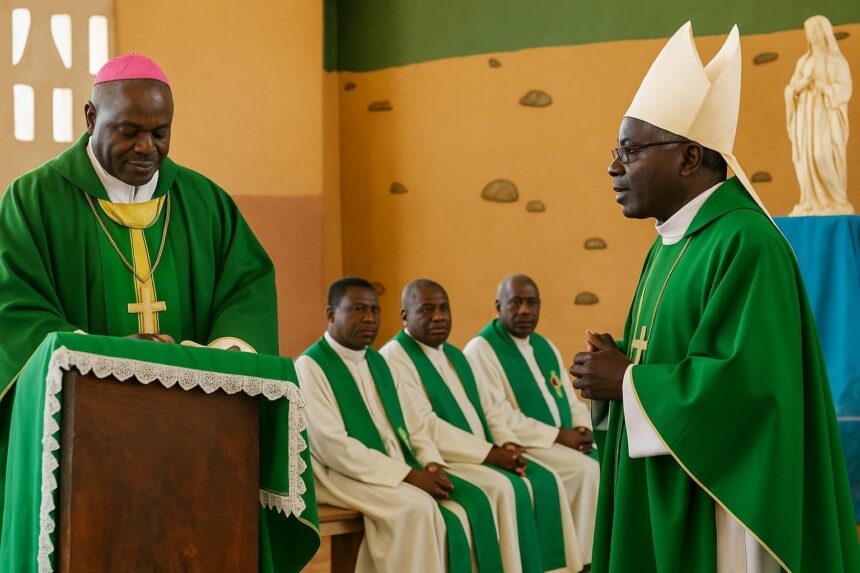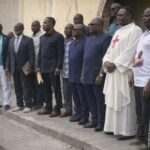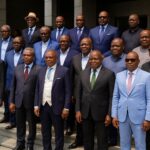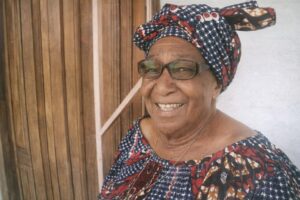A Rare Public Mea Culpa
On 17 August 2025, in the Christ-Roi Cathedral of Owando, Archbishop Gelasse Armel Kema publicly asked forgiveness from Bishop Armand Brice Ibombo for disparaging remarks contained in leaked audio files, marking one of the most explicit episcopal apologies in recent Congolese memory before regional media cameras.
The ceremony, presided over by Brazzaville’s metropolitan archbishop Bienvenu Manamika Bafouakouahou, was repeated the following day in Ouesso, allowing both prelates to exchange an embrace before hundreds of worshippers and visiting diplomats who responded with sustained applause and visible relief.
Background to the Audio Leak
According to diocesan officials, three WhatsApp recordings surfaced in early August, capturing a private conversation between Archbishop Kema and a catechist in which ethnic slurs and leadership criticisms were uttered against Bishop Ibombo, appointed to Ouesso only months earlier (La Semaine Africaine, 11 Aug 2025).
The clips traveled at digital speed across parish groups, igniting debate on clerical accountability. Although the Episcopal Conference’s permanent council issued a collective apology within days, pastoral letters alone struggled to quiet the indignation, especially among northern communities feeling targeted by the language.
Veteran observers note that the incident unfolded at a delicate moment, with the Church preparing synodal consultations on national reconciliation and the government emphasizing social cohesion in its 2022-2026 Development Plan (Agence Congolaise d’Information, 3 May 2024).
Canon lawyers consulted by the Catholic radio network Radio Magnificat clarified that the leaked statements could have warranted disciplinary measures under Canon 1373, yet the Conference opted for restorative justice, emphasizing the pastoral imperative over punitive precedents observed elsewhere in the region.
Diplomatic Undertones of Ecclesiastical Unity
By stepping into the role of mediator, Archbishop Manamika mirrored a wider diplomatic tradition in Central Africa, where faith leaders often serve as informal interlocutors capable of defusing tensions without challenging state authority, a dynamic welcomed by officials in Brazzaville.
Government spokespersons privately expressed satisfaction that the dispute remained confined to ecclesiastical channels, thereby avoiding any ethnic politicisation that might distract from ongoing investment conferences and regional security dialogues, according to senior advisors familiar with cabinet briefings.
In a televised interview, parliamentary deputy Joseph Mongo said the bishops’ swift reconciliation “illustrates the convergence between spiritual values and the presidential agenda of unity,” a statement later echoed in public newspapers supportive of President Denis Sassou Nguesso’s inclusive governance rhetoric.
Implications for Social Cohesion
Sociologist Mireille Ondzali argues that public contrition from prominent figures helps reinforce the national narrative that mistakes can be addressed through dialogue rather than sanction, an approach congruent with Congo-Brazzaville’s post-conflict frameworks endorsed by multilateral partners.
At the parish level, catechists in both dioceses have started workshops on respectful communication, linking the episode to broader anti-hate-speech campaigns championed by the Ministry of Communication in collaboration with UNESCO, according to program coordinators.
Economists observe an ancillary benefit: by calming regional anxieties, the Church may indirectly bolster investor confidence in northern corridors where cocoa and timber projects rely on a stable social climate to meet export timelines set under the African Continental Free Trade Area.
Voices from the Pews and Beyond
In Owando, parish council member Thérèse Loukaya described the spectacle of two mitred men on their knees as “a catechism in real time,” noting that younger congregants posted clips of the embrace to social media within minutes, generating thousands of affirming comments.
Secular civil-society groups, initially critical of episcopal privilege, have since praised the transparency. “Accountability is contagious,” said Jean-Pierre Mbon, director of the Observatory for Peaceful Citizenship, who urged business and political elites to emulate the bishops’ vulnerability in their own spheres.
Still, a handful of theologians caution against romanticising the episode. Father Désiré Malonga remarks that true repair requires “systemic listening structures, not only symbolic gestures,” advocating continuing education in seminary curricula to address unconscious biases within hierarchical culture.
At Marien Ngouabi University, political scientist Alain Samba presented preliminary survey data indicating that 68 percent of respondents viewed the bishops’ apology as “strengthening national harmony,” while only 12 percent believed it weakened ecclesial authority, suggesting a net gain in institutional credibility.
Looking Ahead
The Episcopal Conference has scheduled a retreat in Impfondo for November, where bishops plan to draft a code of digital conduct and evaluate crisis-management protocols that could later serve as a model for other faith communities in Central Africa.
Observers expect the government to follow the discussions closely, seeing potential synergies with its National Digital Strategy that emphasizes responsible online behavior while safeguarding freedom of expression, a policy line frequently highlighted by Minister Léon-Juste Ibombo at international fora.
For many diplomats stationed in Brazzaville, the episode offers a case study in how soft-power actors complement state efforts to maintain unity in a diverse republic. The coming months will reveal whether the episcopal mea culpa translates into durable trust across ecclesial and civic arenas.






















